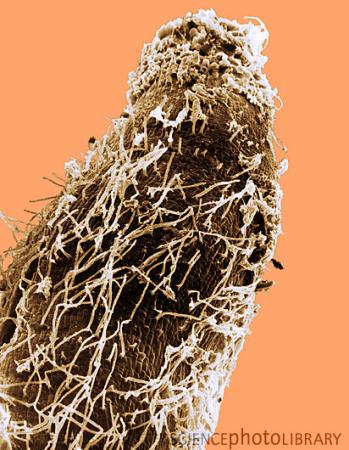自然界中存在许多共生关系,研究人员发现植物根系与土壤中一些细菌之间的共生尤其让人叫绝,它们会通过“地下市场”公平交易所需的营养物质,如果某一方遇到“奸商”还会另寻合作伙伴。

植物根系与土壤细菌有“地下交易”
通常,植物通过光合作用形成碳水化合物,再将其输送到根部,由根系提供给土壤中的细菌。作为交换,细菌则提供植物生长所必需的磷元素。
有趣的是,由于植物的地下根系发达,周围的细菌也多,会形成一个公平的“交易市场”。如果有“吝啬”的细菌不提供足够的磷元素,植物的根系会远离这些“奸商”,另寻“出价”更高的细菌。反之,如果有的植物根系提供较多的碳水化合物,细菌相应提供的磷元素也就更多。
由英国、荷兰、美国等国研究人员组成的研究小组在日前出版的新一期《科学》杂志上报告了这项发现。研究人员测试了蒺藜苜蓿和三种不同细菌之间的关系,结果显示了不同的“市场交易”繁荣程度。
参与研究的英国牛津大学教授斯图尔特•韦斯特说,这个“地下市场”遵循的法则与人类的市场经济非常相似,由于市场参与者众多,交易双方都可以自由选择交易对象。其他一些共生关系中优势方“剥削”弱者,而这种共生关系更加公平。
生物探索推荐英文摘要
Reciprocal Rewards Stabilize Cooperation in the Mycorrhizal Symbiosis
Plants and their arbuscular mycorrhizal fungal symbionts interact in complex underground networks involving multiple partners. This increases the potential for exploitation and defection by individuals, raising the question of how partners maintain a fair, two-way transfer of resources. We manipulated cooperation in plants and fungal partners to show that plants can detect, discriminate, and reward the best fungal partners with more carbohydrates. In turn, their fungal partners enforce cooperation by increasing nutrient transfer only to those roots providing more carbohydrates. On the basis of these observations we conclude that, unlike many other mutualisms, the symbiont cannot be “enslaved.” Rather, the mutualism is evolutionarily stable because control is bidirectional, and partners offering the best rate of exchange are rewarded.







